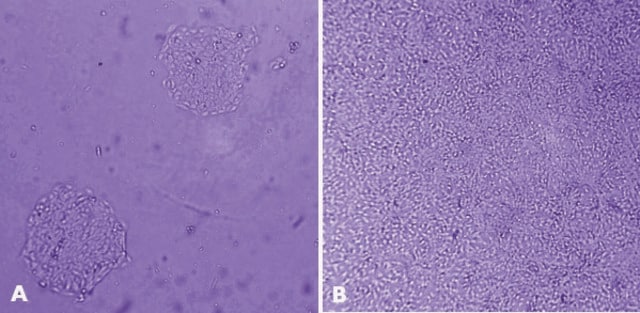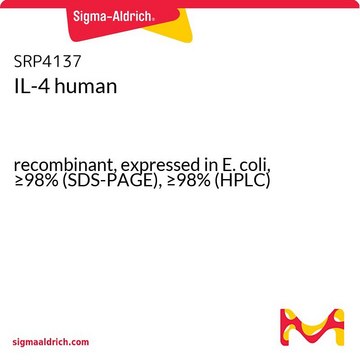SRP3287
IL-34 human
recombinant, expressed in HEK 293 cells, ≥95% (SDS-PAGE), ≥95% (HPLC)
Sinónimos:
C16orf77
Iniciar sesiónpara Ver la Fijación de precios por contrato y de la organización
About This Item
Código UNSPSC:
12352202
NACRES:
NA.32
Productos recomendados
origen biológico
human
recombinante
expressed in HEK 293 cells
Ensayo
≥95% (HPLC)
≥95% (SDS-PAGE)
Formulario
lyophilized
mol peso
52.5 kDa
envase
pkg of 10 μg
impurezas
<0.1 EU/μg endotoxin, tested
Nº de acceso UniProt
Condiciones de envío
wet ice
temp. de almacenamiento
−20°C
Información sobre el gen
human ... IL34(146433)
Descripción general
IL-34 is a ligand for colony-stimulating factor-1 receptor (CSF1R), which also binds to CSF-1. It specifically binds CD14+ monocytes, promotes survival and proliferation of human peripheral blood monocytes, and stimulates macrophage colony formation by human bone marrow cells. IL-34, like human CSF-1 stimulates phosphorylation of MAPK1/ERK2 and MAPK3/ERK1.
Acciones bioquímicas o fisiológicas
IL-34 is a homodimeric cytokine that is expressed in a range of tissues including spleen, heart, brain, liver, kidney, lung, ovary, thymus, testis, small intestine, prostate and colon. Recombinant human IL-34 is a 52.5 kDa homodimeric glycoprotein consisting of 460 amino acid residues, including a C-terminal His-Tag.
Forma física
Lyophilized from 20 mM Sodium Citrate, pH 3.0 + 75 mM NaCl.
Reconstitución
Centrifuge the vial prior to opening. Reconstitute in water to a concentration of 0.1-1.0 mg/mL. Do not vortex. This solution can be stored at 2-8°C for up to 1 week. For extended storage, it is recommended to further dilute in a buffer containing a carrier protein (example 0.1% BSA) and store in working aliquots at -20°C to -80°C.
Palabra de señalización
Warning
Frases de peligro
Consejos de prudencia
Clasificaciones de peligro
Eye Irrit. 2 - STOT SE 3
Órganos de actuación
Respiratory system
Código de clase de almacenamiento
10 - Combustible liquids
Clase de riesgo para el agua (WGK)
WGK 1
Punto de inflamabilidad (°F)
Not applicable
Punto de inflamabilidad (°C)
Not applicable
Elija entre una de las versiones más recientes:
¿Ya tiene este producto?
Encuentre la documentación para los productos que ha comprado recientemente en la Biblioteca de documentos.
Editorial: Leishmania survival mechanisms: the role of host phosphatases.
Marina Tiemi Shio et al.
Journal of leukocyte biology, 88(1), 1-3 (2010-07-02)
Xue Lin et al.
Critical care medicine, 46(6), e584-e590 (2018-02-01)
Sepsis is a devastating condition with a high mortality rate and limited treatments. Sepsis is characterized by a failed host immune response to contain the infection, resulting in organ dysfunction. Interleukin-34 is new cytokine involved in infection and immunity. Whether
Eleonora Franzè et al.
Journal of Crohn's & colitis, 10(1), 87-94 (2015-10-10)
Production of chemokines by intestinal epithelial cells is a key step in the amplification of the destructive immune-inflammatory response in patients with inflammatory bowel diseases [IBD]. In this study, we examined whether intestinal epithelial cells express macrophage colony-stimulating factor receptor
Eleonora Franzè et al.
Clinical science (London, England : 1979), 129(3), 271-280 (2015-03-25)
IBD (inflammatory bowel disease)-related tissue damage occurs in areas which are massively infiltrated with monocytes/macrophages. These cells respond to inflammatory stimuli with enhanced production of cytokines/chemokines. In the present study, we analysed the expression and role of IL (interleukin)-34, a
Eva Rietkötter et al.
Oncotarget, 6(17), 15482-15493 (2015-06-23)
The mononuclear phagocytic system is categorized in three major groups: monocyte-derived cells (MCs), dendritic cells and resident macrophages. During breast cancer progression the colony stimulating factor 1 (CSF-1) can reprogram MCs into tumor-promoting macrophages in the primary tumor. However, the
Nuestro equipo de científicos tiene experiencia en todas las áreas de investigación: Ciencias de la vida, Ciencia de los materiales, Síntesis química, Cromatografía, Analítica y muchas otras.
Póngase en contacto con el Servicio técnico






